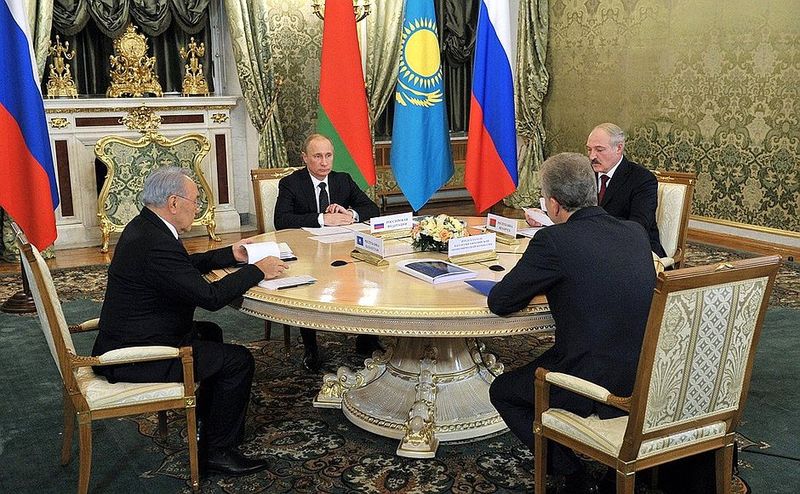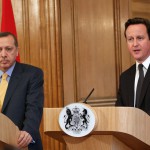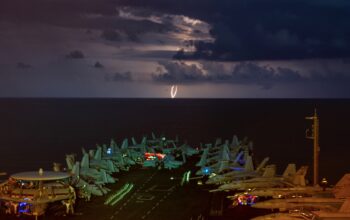On October 9, 2014, Armenia signed the corresponding accession treaty with the Eurasian Economic Union (EEU) of Russia, Belarus and Kazakhstan. It officially joined the ”East’s EU” as many western experts like to say. Whilst the treaty awaits the ratification of the parliaments of the above mentioned three member states, the West recalls the Euromaidan, the Crimean crisis, and other Russian attempts to recreate the USSR, seeking the revival of a bipolar world system which can bring on a new Cold War.
The Eurasian Economic Union (EEU), unlike the EU, was initially only an economic union, which has undergone economic integration since 1995. The Eurasian Economic Community (EurAsEc) was established in 2000 by Russia, Kazakhstan, Belarus, Kyrgyzstan and Tajikistan; it became a Customs Union on January 1, 2010 with an agreement signed by Russia, Kazakhstan and Belarus. (EurAsEc) was officially dissolved this year in order to prepare for the new union.
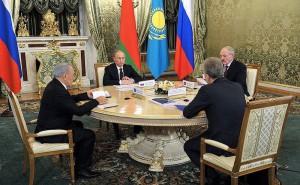 These stages of economic integration prepared space for a common economic zone for the free flow of goods, services and assets where the key sectors such as energy, transport and agriculture will be coordinated by common policies. The EEU is already an existing institution which has its headquarters in Moscow, includes a population of 171 million (with Crimea 173 million), a total GDP of $2.4 trillion, 20% of the world’s natural gas, and 15% of the world’s oil reserves. Members of the Union are free of Customs duties, they allow a free flow of labour, and may import customs-free raw material from each other, thus increasing the production of related goods and trading alliances as well as.
These stages of economic integration prepared space for a common economic zone for the free flow of goods, services and assets where the key sectors such as energy, transport and agriculture will be coordinated by common policies. The EEU is already an existing institution which has its headquarters in Moscow, includes a population of 171 million (with Crimea 173 million), a total GDP of $2.4 trillion, 20% of the world’s natural gas, and 15% of the world’s oil reserves. Members of the Union are free of Customs duties, they allow a free flow of labour, and may import customs-free raw material from each other, thus increasing the production of related goods and trading alliances as well as.
Belarus and Kazakhstan, particularly Kazakhstan, unlike Russia, insists on an economic integration which solely limits the union’s geopolitical role in the international area and doesn’t let it turn into a block equivalent to the EU or ASEAN just yet. Furthermore, politicisation is unacceptable as they believe it may lead to the escalation of an East-West confrontation.
For this reason, the EEU has four decision-making and executive institutions equivalent to the European Commission and EU Council but nothing equivalent to the Parliament or Court of Justice.
Though it is too early to talk about the EEU turning into a distinctive pole of influence, this new single economic market, which was ignored by the West, continues its economic and strategic trajectory. Armenian accession proved that the project is ongoing, and now, Kyrgyzstan and Tajikistan are expected to join the union soon.
But what about other Post-Soviet countries that have the potential to participate in the “new great game”?
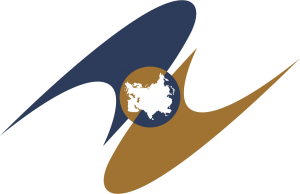 Although western experts claim that Russian leadership tends to broaden the EEU as much as possible bringing about the Moscow’s intention to build the new Union on the best values of the Soviet Union, at the current stage, the Soviet resurgence doesn’t seem to be realistic.
Although western experts claim that Russian leadership tends to broaden the EEU as much as possible bringing about the Moscow’s intention to build the new Union on the best values of the Soviet Union, at the current stage, the Soviet resurgence doesn’t seem to be realistic.
Georgia, from the first day of its independence from the USSR, has had a Western orientation and has not forgotten the 5-day war of 2008, making it is still too early to talk about its possible integration. Moldova has during the recent years had tighter trade links with the EU and Georgia than with Russia, and has signed the Association Agreement with the EU, showing its broad interest in having closer relations with the EU.
Azerbaijan has never shown enthusiasm for joining either EU or EEU integration projects so far, except for claiming they were not ready for any integration as of yet.
The Ukrainian crisis is an ongoing one, leaving us with vague tools to predict future developments.
Central Asian countries on the other hand, are in some sense more manageable for the diplomatic efforts as they depend on the Russian labour market. Seasonal work in Russia shapes the social stability in these countries and compensates for the lack of jobs back home, as it facilitates migratory and capital flows, which affects the GDP. Of course it doesn’t mean that there are no issues regarding their integration.
Central Asian countries have stronger commercial and trading links with China rather than with Russia. Turkmenistan possesses the fourth largest gas resources in the world but due to a price dispute with Russia, fulfills its own gas policy. Turkmenistan is China’s largest foreign supplier of natural gas and plans to supply gas to the EU, India and Pakistan.
Uzbekistan is not stable in the sense of foreign policy and has experience of joining and then withdrawing from regional organizations, such as GUUAM and the Collective Security Treaty Organization.
The accession of Kyrgyzstan is questionable because of the Chinese factor. Although the Union threatens to reduce China’s influence in Central Asia, Nicu Popescu assumes Kyrgyztsan may be the “gate” that will let Chinese goods into the EEU market partly because of the corruptibility of customs officials
The presence of Russian troops in the Tajik-Afghan border as well as the GDP of Tajikstan, for instance, which is affected by the Russian slowdown due to dependancy, should play a key role in the accession of Tajikstan which is still being negotiated.
China abstained from the Union, potentially competing with its own project the ”Silk Road Economic Belt”. It is already a member of the Shanghai Cooperation Organisation (SCO) where Russia and China share hegemony for certain economic and security goals. Besides, Chinese suggestions to create a free-trade zone between SCO member states, has been ignored so far.
Apart from the Post-Soviet countries, in 2013 it was suggested that some European countries, such as Cyprus, Greece and Turkey, would be welcome members to the Union, which would require their withdrawal from the EU bloc (unrealistic). Moreover, Iran and Syria have recently showed their interest in the EEU as well.
The EEU promises to be the most advanced project of regional cooperation in the short-term perspective. Nevertheless, the sanctions imposed on Russia, followed by the oil price slide, may threaten the economic benefits of the member states. As we live in the globalising world where the economic crisis of one country may have a butterfly effect, the ever-changing situation leaves us with vague tools to predict the future. Time will show if the EEU may develop further and lead to the creation of a political component or not.
By Ruzanna Baldryan
Image credit:
Picture 1: kremlin.ru, licensed under CC BY 3.0
Picture 2: Eurasian Economic Union, no copyright
